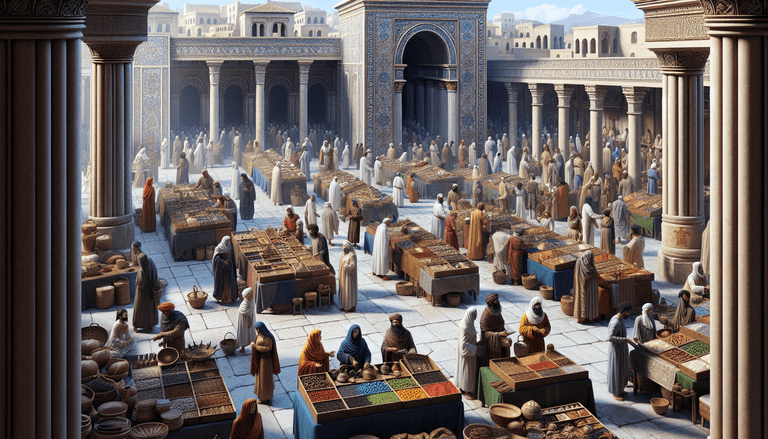Picture this: It’s 122 AD, the Roman Empire is reaching its zenith, and our dear friend Emperor Hadrian is just penning some more travel updates about his latest masterpiece, Hadrian’s Wall, an elegant and imposing line across the northern frontier of Britannia designed to keep the fearsome Picts at bay (or simply provide a dramatic backdrop for Roman selfies). But what if Hadrian harnessed the power of e-commerce to expand the Empire’s economic clout, making the Wall not just a fortified boundary but a thriving trade hub?
Hadrian’s venture into virtual reality, sort of...
Let’s step into the gladiatorial arena of modern technology with Hadrian as our guide, with the might of eBay as his tool. Imagine a digital platform connecting Roman merchants with consumers around the known world, bread, circuses, and everything in between sold with just a scroll-and-click.
Instead of using aqueducts, rampant corruption, and sword-waving legions to simplify consumer transactions, the Empire might have relied on online bidding wars, auction strategies, and customer feedback ratings. Hadrian could promptly review complaints of “Actual Trojan Horse received significantly smaller than presented in listing” or “Helmets arrived dented; seller not recommended.”
Navigating nascency: Would the Emperor adapt to e-commerce?
Imagine Hadrian in a toga, hunched over a sleek MacBook as he coordinates logistics for a new shipment of Egyptian cotton to far-off Gaul, while muttering Latin equivalents of "innovate, disrupt, synergise." According to suit-wearing advisers (anyone named Brutus instantly raising suspicions), e-commerce could streamline commerce across the Empire and woo customers even in those Pictish wildlands beyond the Wall.
The eternal city itself, Rome, would be an e-commerce dreamland. They say all roads lead to Rome, and with eBay’s logistics, those roads wouldn’t just lead to gigantic forums and marble-columned temples but to epic post offices, bustling marketplaces and, interestingly, a newly founded startup named "Speedy Gladius Deliveries.”
The art of the deal, Roman style
Hadrian was a man of culture, priding himself on his architectural ventures. Now envision him curating an "Emperor’s Choice" luxury selection. "Get this finely crafted mosaic mural shipped straight from Pompeii’s finest workshops, with free delivery (an offer valid until Mount Vesuvius erupts)." Loyalty was critical, for to defect from Hadrian’s Tradehub was to find oneself fighting an uphill battle, in both commerce and potentially actual Roman hill campaigns.
For the population, it would be the doors to discovery, "literally everything you never knew you needed, click-to-purchase: Find that elusive blue-dyed toga, freshly imported Libyan wine, or a Greek philosopher for your home symposium." Legionnaires on the far frontiers could make purchases to ease the loneliness with posters of gladiators in action or knick-knacks proclaiming “I crossed Hadrian’s Wall!”
- Too many sellers? Aware of the perils of deceitful sellers, Hadrian’s solution would be a robust and resplendent “Praetorian Guard” customer service team to manage disputes swiftly and justly.
- Phoenician counterfeits? An "Authenticity Guaranteed" programme might well serve identity concerns while triumphantly concealing software terms that even Jupiter found hard to read.
Tradehub Hadrianus would reign supreme as a testament to shrewd imperial advantage-taking, and, dare I suggest, an internet’s version of their colossal territorial grasp.
Happily ever after in Hadrian’s fortress
Ultimately, Emperor Hadrian, the world’s pioneering e-commerce mogul, could board his yacht, er, galley, floating down the Tiber with a smug grin, knowing his reign not only strengthened walls but also the online economy of Rome. Mercantile magnates of the century would muse upon Hadrian’s strategic melding of world trade routes and the bustling grandeur of Tradehub.
And what of the Wall itself? A marvel of engineering designed to separate nations, it would instead grow into a hallmark of connectivity, bridging cultures and fostering alliances through an empire-wide network of goods and services.
Hadrian’s reign would be defined in history not just by architectural innovations but by an unseen electronic web holding the Empire together. Why, even Pliny the Elder might have written: "In wonder do I begin to comprehend the Emperor’s Tradehub, as wondrous as the elephants of Mauritania!"
As always, dear reader, the Romans were on to something exquisite, whether via brick, mortar, or the icon "Add to Cart." O tempora, o mores!







